Each year, the Cheriton Research Symposium concludes with a poster session for Cheriton Graduate Scholarship recipients. In total, 23 students participated in the 2019 Cheriton Research Symposium poster competition.
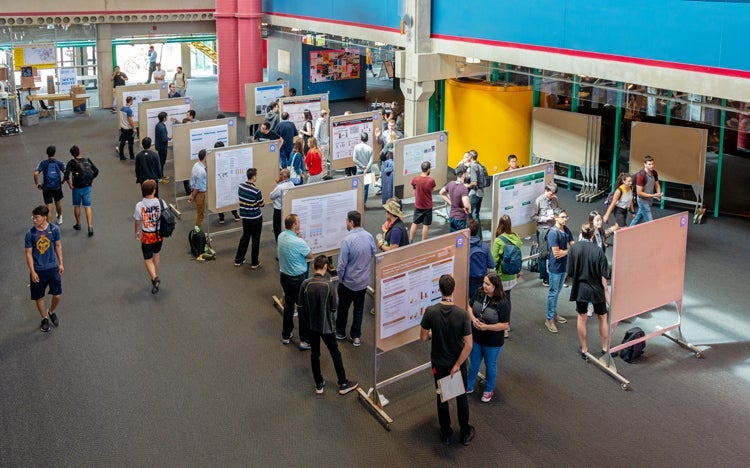
Posters were on display in the Davis Centre atrium, as graduate students explained the theory behind and the results and impacts of their research to David R. Cheriton and a panel of judges from the School of Computer Science.
We are delighted to announce the winners of the 2019 Cheriton Research Symposium poster competition.
First-place winner — $300 prize
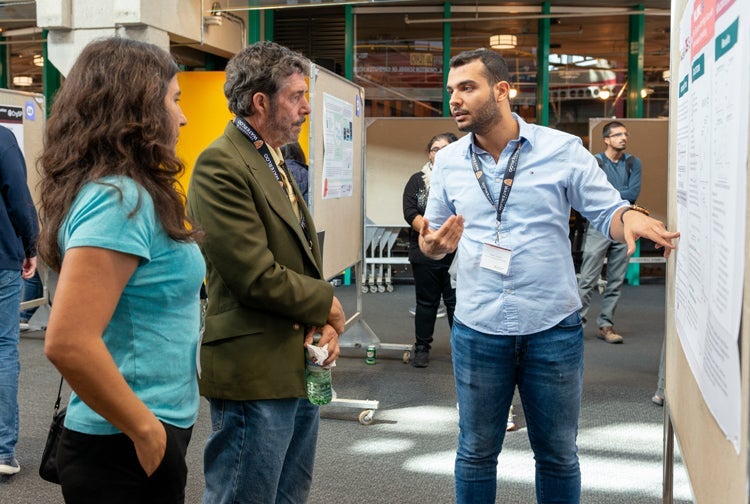
Omar Farhat for “Watermark aware scheduler for stream processing engines” • Khuzaima Daudjee, supervisor
Second-place winners (tie) — $200 prize each
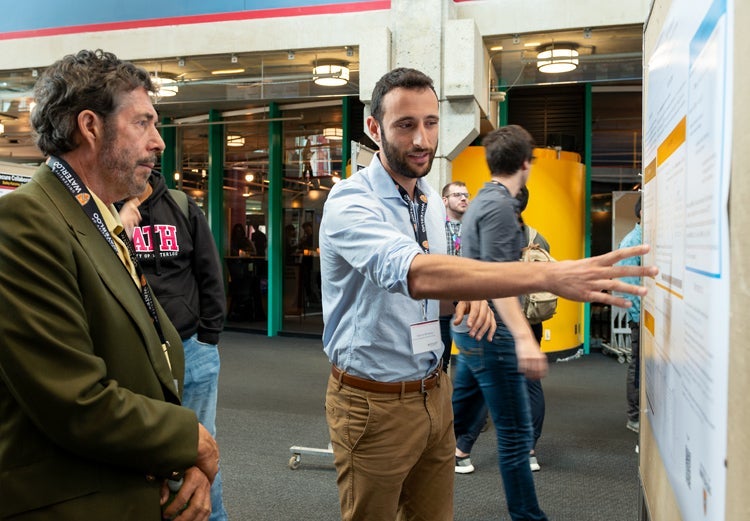
Stavros Birmpilis for “Deterministic reduction of integer nonsingular linear system solving to matrix multiplication” • George Labahn, Arne Storjohann, supervisors
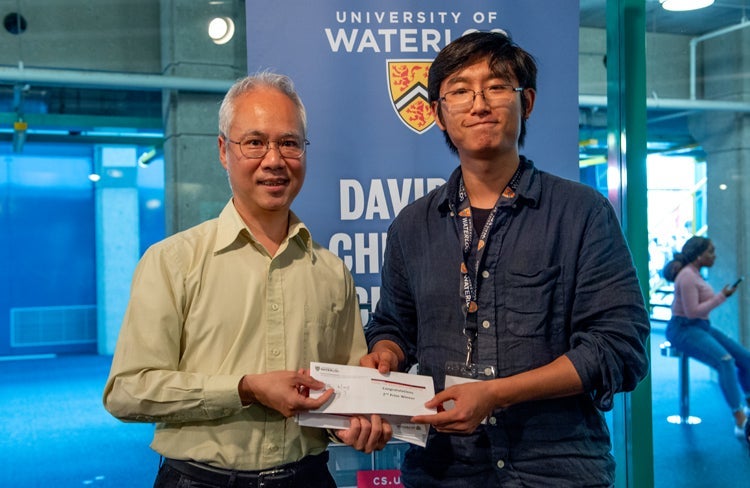
Allen Wang for “Constrained polynomial optimization and application to SPNs” • Yaoliang Yu, supervisor
Third-place winners (tie) — $100 prize each
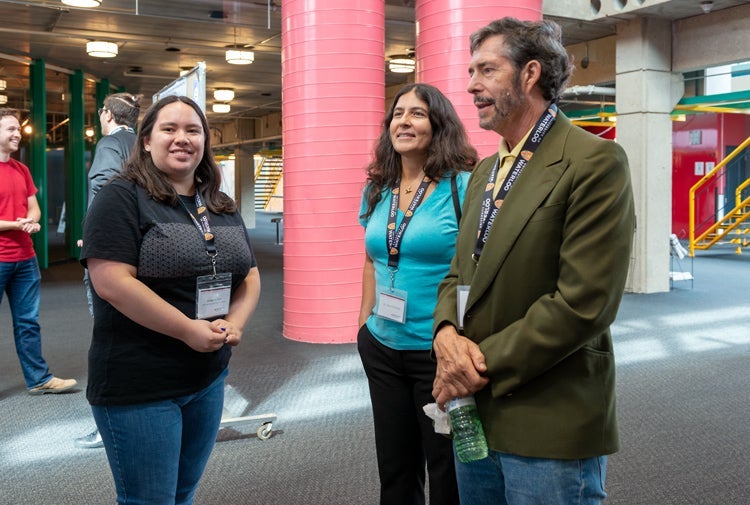
Margaret Foley for “Comparing speech recognition and keyboards for phrase composition and transcription on smartphones” • Daniel Vogel, supervisor
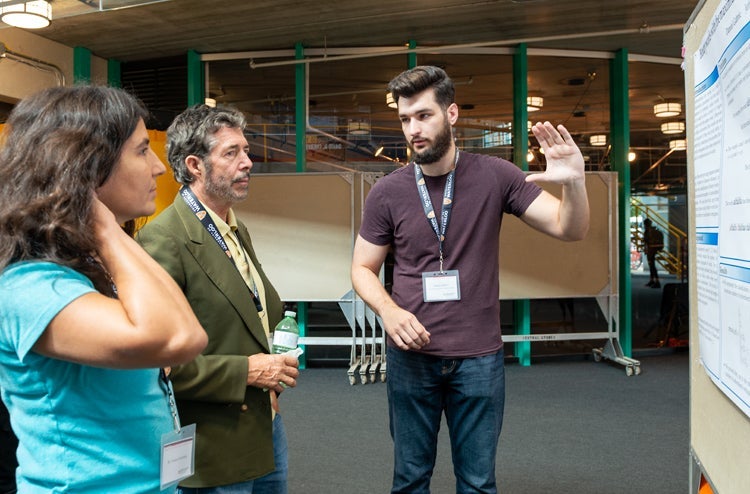
Daniel Gabric for “Unbordered conjugates of binary words” • Jeffrey Shallit, supervisor
Congratulations to the winners and thanks to all who participated in the poster contest!
Poster competition judges
Thanks to Professors Trevor Brown, Kimon Fountoulakis, Mei Naggapan, David Taylor and Olga Veksler, who gave generously of their time to judge the posters and student presentations.
Poster competition participants
| Presenter | Supervisor(s) | Poster title |
|---|---|---|
| Ben Armstrong | Kate Larson | New paradigms for voting |
| Stavros Birmpilis | George Labahn, Arne Storjohann | Deterministic reduction of integer nonsingular linear system solving to matrix multiplication |
| Ryan Clancy | Jimmy Lin | dstlr: Scalable knowledge graph construction from unstructured text |
| Qingnan Duan | Bernard Wong, Srinivasan Keshav | SuperFabric: Making Hyperledger Fabric Byzantine-fault tolerant with high performance |
| Jesse Elliott | Eric Schost, Mark Giesbrecht | Bit complexity for critical point computation in smooth and compact real hypersurfaces |
| Amir Farrag | Yuying Li, Peter Forsyth | Computational finance: Using trend-following to control risk of put portfolio using machine learning |
| Omar Farhat | Khuzaima Daudjee | Watermark aware scheduler for stream processing engines |
| Margaret Foley | Daniel Vogel | Comparing speech recognition and keyboards for phrase composition and transcription on smartphones |
| Daniel Gabric | Jeffrey Shallit | Unbordered conjugates of binary words |
| Amur Ghose | Pascal Poupart | Sum-product networks for machine learning tasks |
| Stan Gurtler | Ian Goldberg | Protecting query privacy in censorship resistant publication |
| Antony Albert Raj Irudayaraj | Daniel Vogel, Omid Abari | Interacting with mobile phones through the pant pocket |
| Mark Iwanchyshyn | Gladimir Baranowski | Revising SPLITS |
| Bailey Kacsmar | Florian Kerschbaum | Privacy and security in collaborative machine learning |
| Clara Kang | Craig Kaplan | Geometry processing for seamless clothing design |
| Dimcho Karakashev | Srinivasan Keshav, Sergey Gorbunov | Linking trusted meters to a blockchain |
| Matthew Lakier | Daniel Vogel | Cross-Car, multiplayer games for semi-autonomous driving |
| Thomas Lu | Chris Eliasmith | Representing spatial relations with fractional binding |
| Allen Wang | Yaoliang Yu | Constrained polynomial optimization and application to SPNs |
| Rina Wehbe | Ed Lank | Personal space in play: Towards understanding social boundaries for large display gaming applications |
| Johann Wentzel | Daniel Vogel | Increasing virtual reality ergonomics through realistic, non-linear input amplification |
| Hsiu-Wei Yang | Jimmy Lin | Aligning cross-lingual entities with multi-aspect information |
| Oscar Zhao | Ali Mashtizadeh | Schedulable Kqueue: Rethinking event-driven server design |